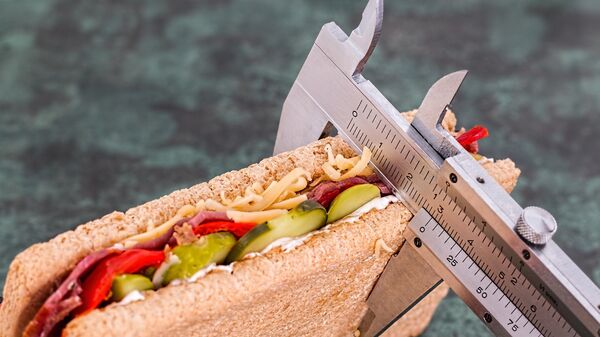There are reportedly at least 100,000 overweight children live in Italy, the country of the Mediterranean diet and delicious food, whichis the highest rate in Europe.
What are the causes of this phenomenon and how can we prevent obesity in children? Biochemist Valter Longo, Director of the Oncology and Longevity Programme at IFOM (Institute of Molecular Oncology of the Italian Foundation for Cancer Research, FIRC) in Milan, author of Longevity Begins in Childhood (''La longevità inizia da bambini'') shared his views on the issue.
Sputnik: Why is the birthplace of the Mediterranean diet, paradoxically, ranked first in such a sad rating? What are the reasons for this phenomenon?
Valter Longo: The data show that there are many causes for this phenomenon. All our paediatrists and experts mainly focused on junk food and carbonated drinks, and from this point of view, our children are not in the worst situation. Italian children drink on average one can of soda per week and eat about 30 grammes of junk food per day. Meanwhile, they eat almost a pound of food rich in starch, which breaks down into sucrose at the same rate as regular sugar. We are talking about potatoes, bread, pizza, rice and fruit juices.
Today, more attention has been paid to the ratio of consumed sugar in general, and its content in soda. In fact, the ratio between the Mediterranean diet and soda sugar is 40 to 1: Italian children consume 40 times more sugar from the Mediterranean diet on average per week than from carbonated drinks.
From the standpoint of a biochemist, this is even funny because it shows a complete lack of scientific justification and the necessary knowledge. This epidemic of obesity is much more associated with starch than with sweets, which, of course, can also contribute to obesity but to a lesser extent. There is another important factor.
Sputnik: Which is it?
Valter Longo: This is the inability of parents to recognise the problem. In our book, we demonstrate that more than 50% of parents of overweight children are not aware of the problem. And the child consumes pasta, pizza, bread and is gaining excess weight. Parents do not give children sweets and do not interfere. Usually, a child with a relatively normal weight is not even taken to a paediatrician or nutritionist. Consequently, these children continue to live with a problem that can become both psychologically and physiologically a lifelong one.
Sputnik: How important is it to teach eating properly from an early age?
Valter Longo: Extremely important! If a child is constantly overweight from 7 to 18 years old, the risk of developing diabetes for the rest of his life will be four times higher. Another problem, even less obvious, is related to protein intake: Italian children eat 2-3 times more protein than they should. And this is not my opinion but the data of all paediatric associations in Italy and around the world. I wish to emphasise the lack of cooperation between the school and parents. Children go to school, where everyone is afraid they will not be fed enough, and give them too much meat, fish and pasta, and then the children come home and eat the same thing again, which results in doubled or tripled protein intake.
Sputnik: And how can this adversely affect in adult life?
Valter Longo: The risk of developing diabetes is getting 4 times higher. Metabolic syndrome, in other words, insulin resistance syndrome leads to diabetes, being also a cause for cardiovascular disease, Alzheimer's disease, and can contribute to cancer development. Therefore, we are talking about lifelong problems for children, which could remain in normal weight without radical measures.
That is, neither the school nor the parents coped with this problem. Of course, paediatricians do what they can but often they themselves did not take a course in nutrition and are not experts in this subject. As I explain in the book, there is a need for thousands of nutritional who know what to do and can monitor the situation. It is useless to tell parents to act in a certain way and schedule a new visit six months later. It is like going to a music teacher who gives a task to learn the lesson and come back in six months. We need methodology, like in music, in sports, at school, to train constantly, and then you can teach proper nutrition.
Sputnik: Can malnutrition be linked to the economic crisis and poverty or is it just a matter of control and education?
Valter Longo: The economic crisis has nothing to do with it. Today you can buy a lot of legumes, frozen vegetables and for 3-4 euros a family can eat for 2-3 days. Add a little more money, and you can buy everything fresh. At one time in Italy we only ate minestrone (Italian thick vegetable soup – ed. note Sputnik) because people ate what they could afford; dried beans, chickpeas was food for the poor. This diet can give the organism everything you need, and meat can be eaten once a week.
Sputnik: How to prevent obesity in children?
Valter Longo: Reduce the amount of starch, that is, pasta, bread, pizza, rice, without extremes, of course. You can, for example, remove potatoes and fruit juices from the diet. If the child is already overweight, he or she must be weighed every other day, in that way you can understand whether the diet is working. If this works, then you have achieved the goal and every month the child will lose a pound and will reach the ideal weight.
It is also important to eat within a 12 hours’ time frame, for example, from 8 am to 8 pm. This is not always easy for children who go to school but you have to figure out a way.
It is important to reduce the amount of protein given the menu at school. A child needs about 1 gram of protein per 1 kg of weight. So if he weighs 20 kg, for the whole day he would need 20 grammes of protein. If he ate a steak at school that means he had already received 35 grammes of protein and until the end of the day he no longer needs protein. I understand that it is not easy for parents to accept this but to do otherwise is only to harm the child.
Sputnik: And, of course, one needs to do more sports?
Valter Longo: Precisely, but not only do sports, simply to move more. For example, every day I go to work and back home on foot, so I already have an hour and a half walk every day. You must make sure the child moves actively every day, and then if you add sports, that would be perfect.




